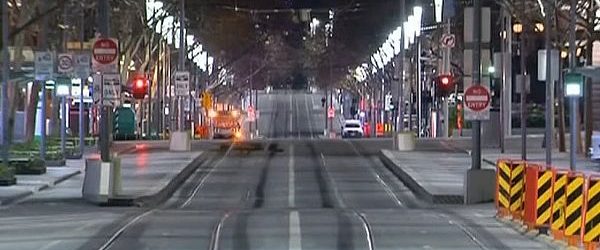A line of hooded figures in uniform stood in Tarntanyangga (Victoria Square) on Kaurna Land (Adelaide). It was the seventh day at a fresh set of 2021 hearings in the inquest into the death of Wayne Fella Morrison. Fella’s sibling, Latoya Aroha Rule, was the first to stand with them. They held wreaths of native flowers to the officer’s faces as they moved past them. The flowers were placed into a white marked van.
Fella spent his final moments in such a van, with a spit hood placed over his head and during a prolonged restraint in which his ankles and wrists were cuffed. He died three days later in hospital. There was no CCTV footage. Whether officers had to tell the court or investigators what happened in that van was so hotly contested by the officers and the Correctional Officers Legal Fund that Fella’s inquest has still not had its final hearing. It has been five years since his passing. The officers did not have to speak in court. They were protected by the penalty privilege. This was determined from question to question and also applied to whole topics of inquiry. When applied the officers were protected from being compelled to share evidence that may expose them to professional or disciplinary consequences. So this vigil, like the court at times, was largely silent.
As long as the inquest is ongoing (it expects to hear final oral submissions on 28 September), it is not yet possible to say what role a spit hood played in Fella’s death—but it is known that a spit hood was implicated the moment it was pulled over his head. It is known that other jurisdictions have contended with bans and active lawsuits after asphyxia-related spit hood deaths among racialised men. It is known that spit hoods pose a risk of asphyxia once they are wet or stuck, that they can prevent identification of early signs of a medical crisis, that they put pressure on vital parts of the neck, and that—when used with common methods of restraint and immobilisation—that they contribute to agonising deaths. It is known that when they are used to punish, intimidate or coerce, they contravene international law. It is known that they are often used to this end.
We can’t abide any of this. We can’t risk the use of one more spit hood in South Australia, because we know what is at stake. As Latoya says in the billboards posted in key electorates on Kaurna yerta this week: ‘if there was a legislated ban on spit hoods my brother could have lived to see his thirtieth birthday.’
Fella moved in this world as a fisherman, an artist, a chef, and a father. He was a Wiradjuri, Kokatha and Wirangu man with cultural connections from the Far West Coast of South Australia to New South Wales. Fella valued his freedom and space. What he loved in his life makes it hard to countenance how he died—without freedom, and without space.
Fella would be thirty-four this year. Latoya has spent much of the last five years pushing for a legislated ban on spit hoods—the device that Fella was forced into before taking his final unassisted breaths. Operational bans, like the one announced to the media by South Australian Corrections in the wake of the vigil held for Fella, are not enough. A ban on spit hoods needs to be enduring, binding law, not a policy whim entrusted to police and corrections officers.
Today the SA Parliament is voting on a private member’s bill, referred to as Fella’s Bill, that would ban spit hoods outright across South Australia in all institutional contexts: prisons and police custody, mental health centres and immigration detention.
Fella’s Bill is a crucial first step towards justice for Fella’s family.
Fella’s mum, Caroline Andersen, welcomed the vote toward legislating the ban on spit hoods:
The last time I heard my son’s voice was a week before his image became synonymous with these barbaric devices. I welcome this step toward accountability, but it isn’t the end for us. I call for a Royal Commission into my son’s death, and a national ban on spit hoods, so that other parents don’t have to suffer this grief.
Fella’s Bill will ensure that no family has to experience this injustice or heartbreak, and that all South Australians are protected from these devices being forced upon them or the people they love.
Until Fella’s Bill is law, the use of spit hoods is dependent on ever-changing government policy and the good faith of police and prisons. The current operational ban in South Australia means that at any time the ban on the use of spit hoods could be reversed. Without legislating the ban on spit hoods by law, the use of these devices could be re-implemented and strengthened with the flick of a pen.
Fella’s family needs your support today to get Fella’s Bill across the line to ensure that these archaic devices are banned forever in all contexts.
To support Fella’s family you can:
1. Share this image
and use the hashtags #BanSpitHoods #LegislateTheBan #JusticeForFella.
2. Let the South Australian Attorney General (Vickie Chapman MP @VickieChapmanMPMinister) and Minister for Corrections (Vincent Tarzia MP @VincentTarzia) know that you want them to vote for Fella’s Bill and include a message of support about why you think they should vote to ban spit hood.
3. Share the factsheet.
Image by Charandev Singh







